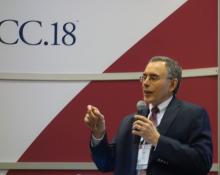ORLANDO – The use of nebivolol as part of a multidrug regimen to treat hypertension was associated with a significantly lower cardiovascular event risk than was combination antihypertensive therapy featuring either metoprolol or atenolol in a large observational study, Brent M. Egan, MD, reported at the annual meeting of the American College of Cardiology.
This retrospective study used health insurance claims data within the massive PharMetrics national U.S. database for 2007-2014 in order to identify 16,787 patients who started on nebivolol as part of a multidrug regimen for hypertension. They were aggressively propensity score–matched on the basis of demographics, clinical characteristics, and duration of follow-up to 16,787 hypertensive individuals on either metoprolol succinate or metoprolol tartrate as part of combination therapy, and to another 16,787 patients who started on atenolol for the same reason. Patients averaged 53 years of age in all three groups. Importantly, this was a primary prevention study: None of the participants had a baseline history of any cardiovascular event.The primary outcome was hospitalization for acute MI, stroke, heart failure, or angina during a mean 600 days of follow-up. In a Cox proportional hazards regression analysis, the risk of the composite outcome was 1.33-fold greater with atenolol and 1.91-fold greater with metoprolol than in the group on nebivolol for their hypertension.
The risk of hospitalization for MI was 1.47-fold greater in the atenolol group and 2.19-fold greater with metoprolol than in patients on nebivolol. Hospitalization for angina was 2.18 times more likely in the atenolol group and 3.39 times more likely in the metoprolol group than in patients on nebivolol. However, there was no between-group difference between the three beta-blockers in terms of stroke or heart failure rates, according to Dr. Egan of the University of South Carolina, Greenville.
He explained that the impetus for this study was that, even though beta-blockers are universally recognized as a cornerstone of secondary cardiovascular prevention, there are much fewer outcome data to support their use in primary prevention. Since nebivolol is a vasodilatory beta-blocker and atenolol and metoprolol are not, Dr. Egan and his coinvestigators hypothesized that this distinction could result in differences in cardiovascular event rates.
One audience member commented, “this study gives a nice hypothesis-generating rationale for doing a large randomized outcomes trial.” Dr. Egan concurred.
His study was supported by Allergan. He reported receiving research grants from Boehringer Ingelheim and serving as a consultant to Medtronic.
SOURCE: Egan BM et al. ACC 18, Abstract 1324M-11.


